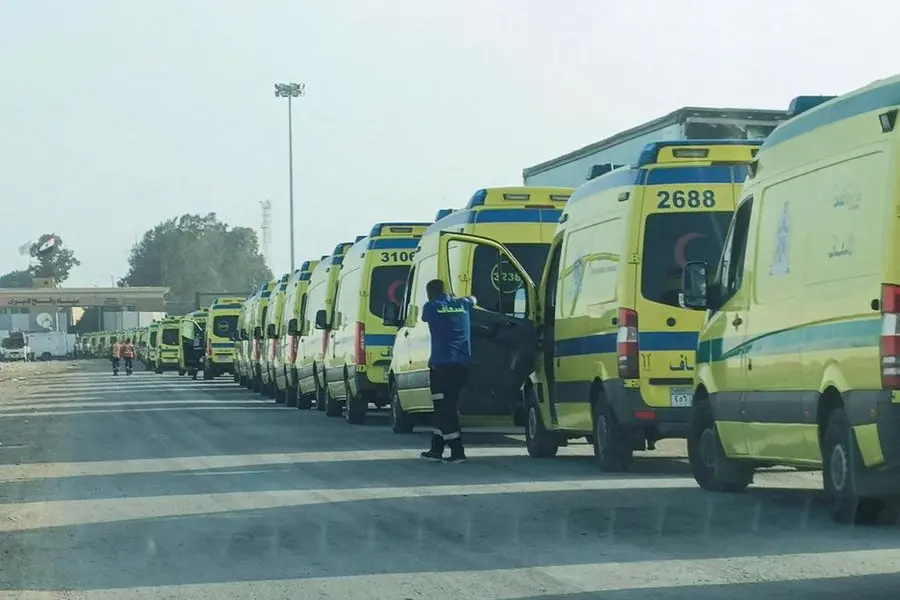PHOTO
GAZA/JERUSALEM - A number of foreigners and critically wounded people were set to leave the Gaza Strip under a Qatari-mediated deal on Wednesday as Israeli forces pushed their offensive against Hamas militants in the besieged Palestinian enclave.
The deal, reached between Egypt, Israel and Hamas, followed another day of bloodshed in Gaza in which an Israeli air strike killed about 50 people in a refugee camp, according to Palestinian health officials. Israel said the attack killed a senior Hamas commander and other combatants.
Communications and internet services were completely cut off in Gaza again on Wednesday, telecommunications provider Paltel said.
Israel sent its forces into Gaza following weeks of air and artillery bombardments in retaliation for a deadly attack by Hamas, which controls Gaza, on southern Israel on Oct 7.
Israel has vowed to wipe out Hamas. But the civilian death toll in Gaza and the desperate humanitarian conditions have caused great concern across the world as food, fuel, drinking water and medicine run short and hospitals struggle to treat casualties.
The Gulf state of Qatar, which maintains ties with Israel and Hamas, mediated a deal between the two sides to allow some critically wounded people and foreign passport holders out of Gaza into Egypt, a source briefed on the matter told Reuters.
Ambulances could be seen waiting at the Rafah border crossing between Egypt and Israel, where the evacuations will take place.
The source said this deal, however, was not linked to other issues, such as the release of about 240 hostages held by Hamas and a "humanitarian pause" in the fighting which many countries have called for but which Israeli Prime Minister Benjamin Netanyahu has rejected.
The Hamas attack on southern Israel on Oct. 7 killed about 300 soldiers and some 1,100 civilians, Israeli figures say.
At least 8,525 Palestinians, including 3,542 children, were killed in Israeli strikes on Gaza since Oct.7 , the Gaza health ministry says.
REFUGEE CAMP HIT
The Israeli military said Tuesday's strikes on Jabalia, Gaza's largest refugee camp, had killed Ibrahim Biari, a Hamas commander it said was "pivotal" in the planning and execution of the Oct. 7 assault, as well as dozens of Hamas militants.
Palestinian health officials said at least 50 Palestinians were killed and 150 wounded, while a Hamas statement said there were 400 dead and injured in Jabalia, which houses families of refugees from wars with Israel dating back to 1948.
Eleven Israeli soldiers were also killed in fierce fighting on Tuesday, the Israeli military said, the biggest one-day loss for the armed forces since the initial assault.
Israeli Defence Minister Yoav Gallant said on Wednesday that Hamas militants had two options – "either be killed or surrender without conditions."
"That is the war (for) the future of Israel - nothing less," he said.
After a lull of several hours in rocket fire, the Israeli military were sounding sirens in multiple southern communities as well as the port cities of Ashkelon and Ashdod.
POWER OUTAGE
Two of Gaza's main hospitals - Al Shifa Medical and the Indonesian Hospital - faced a power outage as their generators rapidly run out of fuel.
Ashraf Al-Qidra, spokesperson for Gaza health ministry, called on petrol stations owners in the enclave to urgently provide fuel as doctors worked around the clock to treat casualties with whatever supplies they have at hand.
"We take it an hour at a time," Dr. Mohammed al-Run said.
U.S. Secretary of State Antony Blinken, who will visit Israel on Friday, said the United States and other countries were looking at "a variety of possible permutations" for the future of Gaza if Hamas militants are removed from control.
Iran supports Hamas, as well as several other militant groups in the region, and the conflict in Gaza has triggered fears of a wider escalation.
On Wednesday, the Israeli military said it had deployed missile boats in the Red Sea, following long-range drone and missile attacks claimed by the Houthis in Yemen.
(Reporting by Nidal al-Mughrabi and Emily Rose; additional reporting by Reuters bureaux; Writing by Miral Fahmy and Angus MacSwan, Editing by Lincoln Feast and Louise Heavens)





















